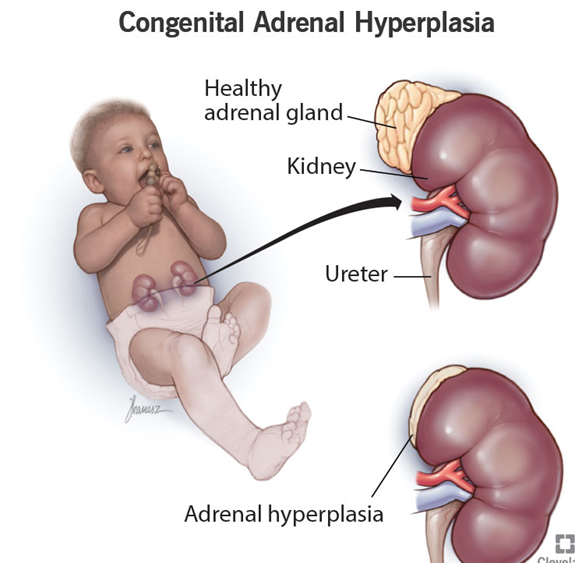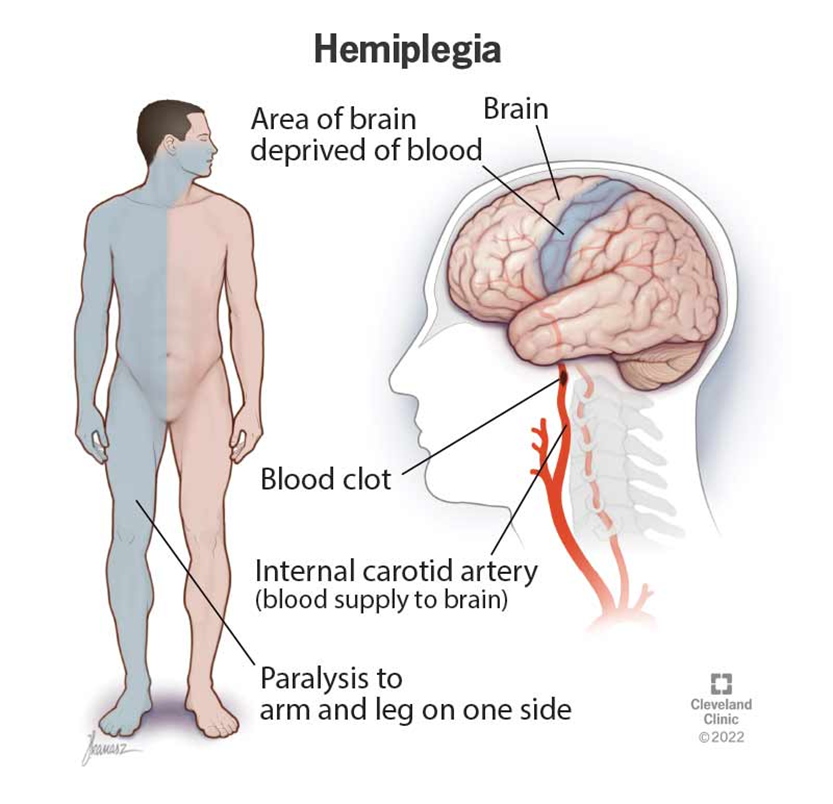A neonate born with ambiguous genitalia is diagnosed with congenital adrenal hyperplasia (CAH). This is an autosomal recessive disorder which causes an overproduction of:
Androgens
Vitamin K
Gonadotropin
Vitamin D
The Correct Answer is A
The correct answer is a) Androgens.
Choice A reason:
Congenital adrenal hyperplasia (CAH) is a group of genetic disorders affecting the adrenal glands, which are responsible for producing vital hormones such as cortisol, aldosterone, and androgens. In CAH, there is a deficiency of the enzyme 21-hydroxylase, which is crucial for the synthesis of cortisol and aldosterone. As a result, the adrenal glands overproduce androgens, leading to symptoms such as ambiguous genitalia in newborns, early puberty, and rapid growth. Androgens are male sex hormones, including testosterone, which play a significant role in the development of male characteristics.

Choice B reason:
Vitamin K is a fat-soluble vitamin essential for blood clotting and bone health. It is not related to the overproduction of hormones in congenital adrenal hyperplasia. Vitamin K deficiency can lead to bleeding disorders, but it does not cause the symptoms associated with CAH, such as ambiguous genitalia or early puberty. Therefore, this choice is incorrect.
Choice C reason:
Gonadotropins are hormones produced by the pituitary gland that stimulate the gonads (ovaries and testes) to produce sex hormones and gametes (eggs and sperm). While gonadotropins play a role in sexual development and reproduction, they are not overproduced in congenital adrenal hyperplasia. The primary issue in CAH is the overproduction of androgens due to enzyme deficiencies in the adrenal glands. Therefore, this choice is incorrect.
Choice D reason:
Vitamin D is a fat-soluble vitamin essential for calcium absorption and bone health. It is not related to the overproduction of hormones in congenital adrenal hyperplasia. Vitamin D deficiency can lead to bone disorders such as rickets in children and osteomalacia in adults, but it does not cause the symptoms associated with CAH. Therefore, this choice is incorrect.
Nursing Test Bank
Naxlex Comprehensive Predictor Exams
Related Questions
Correct Answer is A
Explanation
Choice A reason:
Weight loss despite increased eating is a classic symptom of type 1 diabetes mellitus in children. This occurs because the body is unable to use glucose for energy due to a lack of insulin. As a result, the body starts breaking down fat and muscle for energy, leading to weight loss even though the child may have an increased appetite.
Choice B Reason:
Pale, moist skin is not typically associated with type 1 diabetes mellitus. This symptom is more commonly related to conditions such as anemia or infections. In type 1 diabetes, the skin may actually appear dry due to dehydration caused by high blood sugar levels.
Choice C Reason:
Weight gain and fluid overload are not characteristic of type 1 diabetes mellitus. In fact, children with type 1 diabetes often experience weight loss. Fluid overload is more commonly seen in conditions such as heart failure or kidney disease.
Choice D Reason:
Poor sleep with frequent awakening is not a specific symptom of type 1 diabetes mellitus. While children with diabetes may experience nocturia (frequent urination at night) due to high blood sugar levels, this is not the primary clinical manifestation. The main symptoms are related to hyperglycemia and the body’s inability to use glucose for energy.
Correct Answer is D
Explanation
Choice A reason:
Releasing traction every hour to perform skin care: Releasing traction every hour is not recommended as it can disrupt the alignment and healing process of the fractured femur. Skin care is important, but it should be performed without compromising the traction setup.
Choice B Reason:
Releasing traction once every 8 hours to check circulation: While checking circulation is crucial, releasing traction every 8 hours is not necessary and can interfere with the therapeutic benefits of traction. Circulation can be monitored without releasing the traction.
Choice C Reason:
Maintaining continuous traction until 1 hour before the scheduled surgery: Continuous traction is essential to maintain the alignment of the fractured femur. However, there is no need to release traction 1 hour before surgery unless specifically instructed by the surgical team.
Choice D Reason:
Maintaining continuous traction and checking the position of traction: This is the most appropriate action. Continuous traction ensures proper alignment and healing of the fractured femur. Regularly checking the position of traction helps prevent complications and ensures the effectiveness of the treatment.

Whether you are a student looking to ace your exams or a practicing nurse seeking to enhance your expertise , our nursing education contents will empower you with the confidence and competence to make a difference in the lives of patients and become a respected leader in the healthcare field.
Visit Naxlex, invest in your future and unlock endless possibilities with our unparalleled nursing education contents today
Report Wrong Answer on the Current Question
Do you disagree with the answer? If yes, what is your expected answer? Explain.
Kindly be descriptive with the issue you are facing.
